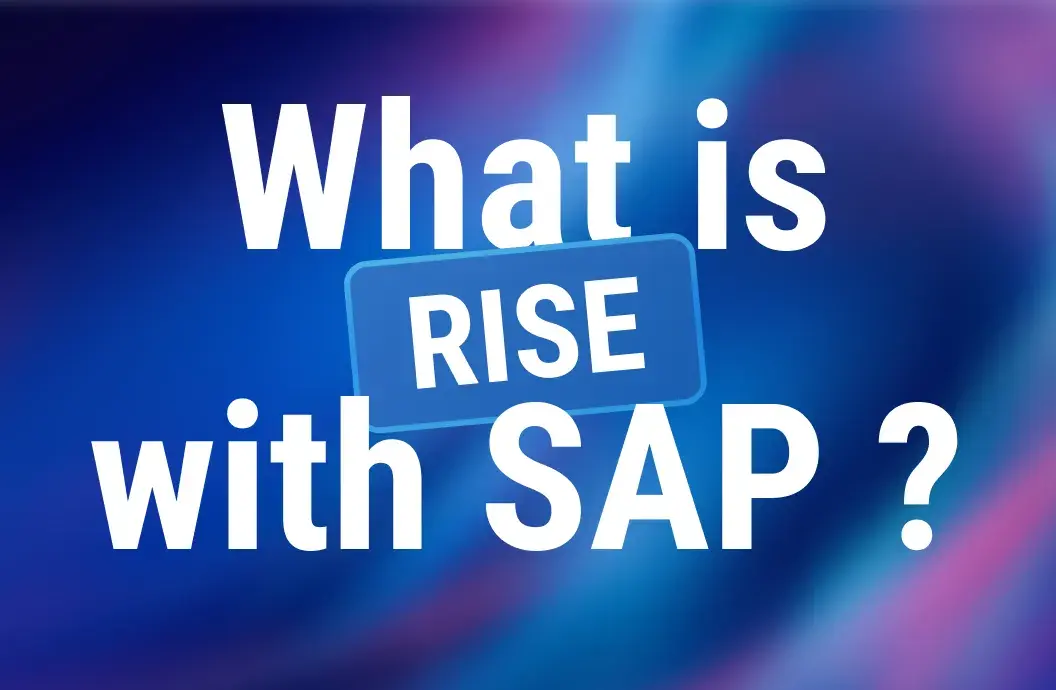We continue to consider SAP S/4HANA editions. This time, we are looking into SAP S/4HANA Cloud and challenges you can face when implementing this ERP system.
SAP S/4HANA Cloud: Advantages and Challenges
In today’s climate of economic uncertainty and rapid technological change, businesses face increasing pressure to build resilient supply chains, stay competitive, and harness the power of AI and predictive insights. SAP S/4HANA helps organizations meet these challenges by creating a unified digital environment to manage core business processes. Our earlier article compared this system's on-premises and cloud deployment models.
Here, we focus on SAP S/4HANA Cloud, exploring its key advantages and the challenges companies must prepare to overcome. With mainstream maintenance for SAP ECC ending in 2027, the window for a planned migration is closing, making the move to a modern platform like SAP S/4HANA Cloud more urgent than ever.
What Is SAP S/4HANA Cloud?
SAP S/4HANA Cloud is a modern cloud-based ERP system that combines core business processes into a single, intelligent platform. It is designed to handle complex tasks in real-time and provide the agility businesses need to grow.
Key features of SAP S/4HANA Cloud include:
- A cloud-based architecture that eliminates the need for physical servers.
- Intelligent technologies, such as artificial intelligence, analytics, and machine learning, to optimize operations.
- A modular design that enables customization to meet your business needs.
Key Advantages of SAP S/4HANA Cloud
Cloud solutions bring advantages that go beyond cost savings. For companies striving for agility and resilience, the cloud has become a strategic necessity rather than an option.
Easy scalability
SAP S/4HANA Cloud enables businesses to scale resources up or down according to demand. New modules or capabilities can be added without complex infrastructure projects, ensuring IT capacity grows alongside business needs.
Worldwide data access
Employees, partners, and suppliers can access the same information with a centralized, real-time data model, regardless of location. This unified view fosters collaboration across departments and geographies, helping accelerate decision-making and streamline operations.
Reduced infrastructure costs
Organizations eliminate the expense of hardware purchase, maintenance, and upgrades by moving away from on-premises servers. Subscription-based pricing ensures businesses only pay for the features and capacity they use, optimizing the total cost of ownership.
Agility and resilience
SAP S/4HANA Cloud makes it easier to respond quickly to shifting market conditions and customer expectations. Integrated analytics, automation, and supply chain coordination improve efficiency, shorten product lifecycles, and strengthen resilience against disruption.
Ongoing innovation
Regular system updates deliver the latest SAP technologies, such as AI, machine learning, and predictive analytics, without the need for large-scale upgrade projects. As a result, businesses can adopt innovations faster and maintain a competitive edge.
Supporting sustainability goals
Beyond efficiency and cost savings, cloud ERP contributes to long-term sustainability. By centralizing operations, companies reduce reliance on energy-intensive local infrastructure. SAP S/4HANA Cloud also integrates with solutions like SAP Sustainability Control Tower, enabling organizations to track carbon emissions, improve supply chain transparency, and meet ESG reporting requirements.

Understanding the Challenges of SAP S/4HANA Cloud
While SAP S/4HANA Cloud delivers clear advantages, organizations should also be aware of the potential challenges of cloud adoption. Addressing these issues early helps reduce risks and ensures a smoother transition.
Limited customization in public cloud
Public cloud ERP solutions are built on standardized processes and predefined configurations. This limits flexibility and may not fully accommodate unique or highly specialized industry requirements.
Update control and vendor dependency
SaaS updates are typically managed by the vendor and applied automatically. While this ensures continuous access to innovation, it reduces control over release timing and can sometimes disrupt custom integrations or workflows.
Integration with legacy or third-party systems
Connecting a cloud ERP with older on-premises systems or external applications can be complex. Compatibility issues, limited APIs, and data migration challenges often require additional planning and resources.
Data security in shared environments
Multi-tenant cloud models increase exposure to shared infrastructure risks. Even with strong encryption and access controls, organizations must carefully evaluate providers’ compliance with industry-specific security standards.
Industry-specific limitations in public editions
Public editions are optimized for broad use cases, but may not support niche industry scenarios without additional customization. Businesses in regulated or specialized sectors often need private cloud or hybrid approaches.
Change management and user adoption
The success of any ERP initiative depends on people as much as technology. Without strong change management, training, and user engagement, organizations risk low adoption and underutilization of system capabilities.
Hidden costs and total cost of ownership (TCO)
While subscription pricing lowers upfront investment, the costs of migration, integration, training, and ongoing support can add up. A precise TCO analysis is essential to avoid surprises.
Project complexity
Implementing SAP S/4HANA Cloud goes far beyond a technical migration; it requires a fundamental transformation of business processes. These projects typically involve numerous stakeholders, extensive data migration, system integrations, and the redesign of core workflows. Without proper expertise, organizations risk delays, escalating costs, and solutions that fail to meet business objectives.
Architecture and Principles of SAP S/4HANA Cloud
Unlike SAP S/4HANA On-Premise, which is essentially a product, SAP S/4HANA Cloud is a service. It is characterized by a modular approach, multitenant architecture, workload isolation, and segregation of duties, but retains the concept of a single ERP core. All the corporate apps work independently from each other, but at the same time, they are combined into a single ecosystem.
SAP S/4HANA Cloud provides businesses with innovative technologies that help companies manage complex processes and system landscapes. Due to this, you can transform your business according to its growth rate.

SAP S/4HANA Cloud offers two extensibility levels:
- Cloud applications and UI adaptation
- System extensibility with SAP Business Technology Platform (SAP BTP)
SAP BTP is a foundation for SAP cloud applications. It combines process models, data models, business services, and application programming interfaces (API). Additionally, it helps expand SAP applications and provides businesses with the required flexibility. This platform has embedded analytics and real-time reporting features that help companies build an organizational and partner ecosystem.
SAP Cloud ERP and SAP Cloud ERP Private: What’s the Difference?
Today, SAP offers businesses two cloud editions: SAP Cloud ERP and SAP Cloud ERP Private. Let’s compare them to better understand which model will meet your business needs.
| Feature | SAP Cloud ERP Private | SAP Cloud ERP |
| Deployment environment | Dedicated cloud environment (hosted on hyperscaler or SAP partner infrastructure) | Multi-tenant SaaS, operated only by SAP |
| Implementation | Supports both Brownfield and Greenfield | Only Greenfield |
| Speed of deployment | Slower due to customization and integration requirements | Faster due to standard processes and predefined best practices |
| Target audience | Large enterprises or organizations with complex/unique processes and industry needs | Small and mid-sized businesses or enterprises ready to adopt standard processes |
| Provider/hosting | Customer can choose provider (AWS, Azure, GCP, SAP, or partner) | Only SAP (runs in SAP data centers) |
| Updates | Annual release updates plus optional feature packs | Two major releases per year; smaller, non-disruptive feature deliveries between major releases |
| Cost | Higher cost due to dedicated infrastructure and customization | Lower cost due to SaaS (subscription-based) and shared infrastructure |
| TCO | Typically higher | Typically lower |
| Integration/ compatibility | Broad integration options, including legacy and on-premise systems | Standardized integration, mainly via SAP BTP and APIs |
| Security and data control | Enhanced security with dedicated environment; option to choose a specific data center location | Common security standards with shared infrastructure |
| Data migration | Supported via SAP S/4HANA Migration Cockpit (staging tables, direct transfer from SAP systems) | Also supported via SAP S/4HANA Migration Cockpit (templates, direct transfer); more standardized approach |
| Industry coverage | Full industry scope (comparable to SAP S/4HANA On-Premise) | Covers key business processes and selected industries (finance, sales, procurement, production, HR, etc.) |
Which Businesses Should Choose SAP S/4HANA Cloud Edition?
Public Cloud
SAP Cloud ERP best suits organizations looking for speed, standardization, and cost efficiency. Small and medium-sized businesses benefit most from this model, as it provides preconfigured best practices that simplify daily operations. Larger enterprises often use the public edition in regional branches or subsidiaries where a lean, standardized ERP is sufficient. Industries such as finance, procurement, HR, and production gain particular advantages from its streamlined processes.
Private Cloud
SAP Cloud ERP Private is designed for companies that require greater flexibility, customization, and control. Medium and large enterprises in highly regulated or specialized industries, such as healthcare, automotive, life sciences, or manufacturing, often prefer this model. It allows businesses to tailor processes to unique requirements, integrate industry-specific add-ons, and maintain stricter data security and compliance control.
RISE with SAP and GROW with SAP — What Are They and Why Are They Important?
If transitioning to SAP S/4HANA feels overwhelming, SAP offers two comprehensive solutions: RISE with SAP and GROW with SAP. These are ready-made packages that offer the services and tools needed for cloud ERP migration.
- RISE with SAP is a complete package for medium and large enterprises seeking flexibility and a personalized transition. It includes business transformation guidance, an SAP S/4HANA subscription, and tools to optimize processes.
- GROW with SAP is an option for small and medium-sized businesses. It offers scalable tools and fixed processes, focusing on the simplicity and speed of implementing cloud solutions.
These programs not only speed up the transition to SAP S/4HANA, but they also help companies adjust to new business realities.
.webp)
Choosing the Cloud Platform Is Important
After selecting the appropriate SAP S/4HANA version, the next step is deciding on a cloud platform for deployment. The most popular options today are AWS, Azure, and Google Cloud. Here's a brief look at the advantages of each:
- Amazon Web Services (AWS) is a leading provider with extensive experience working with SAP. It offers a wide range of certified instances optimized for SAP HANA, along with powerful migration tools. AWS is known for its high performance and scalability.
- Microsoft Azure is a great choice for companies that are already using Microsoft products. Azure provides seamless integration with tools like Microsoft 365 and Power BI, along with advanced security features.
- Google Cloud is ideal for businesses focused on agility and innovation. It supports SAP HANA, offers powerful analytics and AI tools, and is a cost-effective solution for startups and mid-sized companies.
Now, let’s compare their features in detail:
| AWS, Azure, Google 一 Which One to Choose for SAP S/4HANA Cloud | |||
| AWS | Azure | Google Cloud | |
| Experience with SAP | Partner since 2011, supporting SAP HANA, S/4HANA, and BW/4HANA with SAP-optimized instances. | SAP partner in the Embrace project, focusing on integration with S/4HANA and Microsoft products. | Partner since 2017, actively implementing SAP Data Cloud and analytics services. |
| Certified VMs | Over 200 certified instances for SAP workloads, including x1, x2, and r5 types. | E64s_v3 certified VMs, optimized for SAP HANA with up to 12 TB of memory. | Smaller selection of certified instances, optimized for databases with up to 6 TB. |
| SAP HANA performance | Delivers high performance with high-bandwidth instances (up to 100 Gbps). | Optimized infrastructure with low latency for SAP HANA workloads. | Designed for medium workloads with a focus on resource efficiency and stability. |
| Security | AWS Identity and Access Management (IAM), Shield for DDoS protection, and data encryption with KMS. | Includes Azure Security Center, Advanced Threat Protection (ATP), and built-in TLS/SSL encryption. | Offers Cloud Security Command Center, Cloud Armor for attack protection, and custom encryption keys. |
| Migration tools | Offers AWS Migration Hub and SAP Rapid Migration Test Cases for fast migration. | Azure Migrate and SAP Data Migration Framework provide ready-to-use migration scenarios. | Provides Google Migrate for SAP, supporting heterogeneous migration scenarios. |
| Speed and scalability | Easily scales up to 48 TB RAM per server, with fast regional reserve setup. | Supports scaling up to 12 TB for SAP HANA and offers flexible computing configurations. | Easily scalable for medium workloads, with flexible configurations. |
| Integration with other services | Works seamlessly with AWS IoT and analytics tools like Redshift and Quicksight. | Best for Microsoft 365, Power BI, and Teams integration. | Provides AI and ML tools and integrates well with BigQuery and Looker. |
| Use cases | Trusted by large enterprises like Unilever, BP, and Philips for complex SAP systems. | Popular among corporations, like Coca-Cola and BMW for combining ERP with enterprise systems. | Ideal for startups and agile businesses, used by PayPal and Evernote. |
To sum up, AWS is the best suited for companies prioritizing scalability, a global network, and handling large volumes of data. Azure is ideal for businesses heavily reliant on Microsoft products, offering seamless hybrid solutions and integration with Microsoft 365. Google Cloud is a top choice for companies focused on analytics, AI innovation, and big data tools.
Each platform has unique advantages. The decision should align with your business needs, IT infrastructure, and long-term goals.
How to Choose the Right ERP Cloud Strategy
Selecting the right ERP cloud model is a technical decision as well as a strategic one. The choice should reflect the organization’s business goals, industry context, and long-term growth plans. The following steps can help you choose the ERP strategy that works best for your business:
1. Assess process maturity and industry needs
Begin by evaluating how standardized or unique your processes are. Highly regulated or specialized industries often require more customization, while companies with streamlined processes may benefit from public cloud solutions.
2. Define the level of customization required
Public cloud favors standardization and rapid deployment. If your organization relies heavily on differentiated processes or industry-specific functions, a private or hybrid cloud may be the better fit.
3. Choose between public, private, or hybrid models
When evaluating deployment models, organizations should balance cost, flexibility, and control. The public cloud offers standardization and rapid deployment, but with limited customization. The private cloud provides greater adaptability and control, though at a higher cost. A hybrid approach allows companies to combine both, supporting gradual migration and continued use of legacy systems while adopting cloud innovations.
4. Evaluate platforms and vendors
Consider the ERP system, as well as the underlying cloud platform (AWS, Azure, Google Cloud). Assess performance, security, integration capabilities, licensing models, and the vendor’s track record in your industry.
5. Plan the implementation approach
Decide whether to pursue a phased rollout or a “big bang” migration. Partnering with experienced consultants helps mitigate risks and ensures alignment with best practices.
6. Focus on governance and change management
Establish transparent project governance and invest in user training, communication, and ongoing support. Strong change management is essential for adoption and long-term success.
7. Define success metrics and KPIs
Set measurable goals — such as process efficiency, cost reduction, data quality, or agility — to track performance and validate ROI after deployment.
8. Incorporate risk and compliance planning
Ensure your ERP strategy aligns with compliance requirements (e.g., GDPR) and includes a clear risk management framework. Understand the shared responsibility model between your organization and the cloud provider.
Why Choose LeverX and SAP for Your Cloud ERP Journey
Selecting the right ERP platform is only part of the equation. The success of your transformation depends on having an experienced partner who can guide you through strategy, implementation, and long-term optimization. That’s where LeverX comes in.
Who we are
LeverX is a global system integrator and SAP Gold Partner with over 20 years of experience helping enterprises modernize their business processes. We specialize in SAP solutions across industries and deliver projects of any scale and complexity.
Our core services for SAP S/4HANA Cloud
- Implementation and migration: End-to-end services for public, private, or hybrid editions, including data migration, system integration, and customization.
- RISE with SAP & GROW with SAP enablement: Guidance and execution to accelerate adoption through SAP’s packaged transformation programs.
- Process optimization and best practices: Aligning your ERP environment with industry standards to maximize efficiency and minimize risks.
- SAP BTP extensibility: Expanding your cloud ERP with custom applications, analytics, and integrations through SAP Business Technology Platform.
- Maintenance and support: Continuous monitoring, updates, and enhancements to ensure long-term value from your investment.
Proven experience
We have successfully delivered hundreds of SAP S/4HANA projects across manufacturing, healthcare, retail, automotive, life sciences, and other industries. Our portfolio includes complex international rollouts, Greenfield, Brownfield, and Bluefield migrations, and tailored hybrid deployments.
Why companies partner with LeverX
- Deep SAP expertise: Over two decades of collaboration with SAP, supported by a strong track record of global projects.
- Industry knowledge: Experience in verticals with complex compliance and regulatory requirements.
- End-to-end partnership: From strategy and advisory to implementation, integration, and ongoing support.
- Proven methodology: Agile, best-practice-driven project delivery that minimizes risk and accelerates time to value.
- Focus on innovation: Leveraging AI, IoT, predictive analytics, and SAP BTP to future-proof your business.
Partnering with LeverX means more than implementing a system; it is about creating a resilient digital foundation that enables your business to scale, adapt, and compete in the long term.
Bottom Line
SAP S/4HANA Cloud offers powerful advantages — from scalability and automation to faster innovation — while presenting challenges businesses must carefully anticipate. The right choice depends on your company’s size, industry, and long-term goals. You can build a resilient ERP foundation that supports growth and adaptability by evaluating public, private, or hybrid editions and selecting a suitable cloud platform.
If you’re considering a move to SAP S/4HANA Cloud, LeverX can guide you every step of the way. Our experts will help you choose the best-fit cloud edition and ensure a smooth transition that maximizes the value of your investment.
FAQ
Yes. SAP S/4HANA Cloud is designed to handle complex global operations across multiple legal entities, regions, and currencies. It provides built-in support for:
- Multi-company structures: You can manage separate legal entities within a single system while maintaining centralized governance and consolidated financial reporting.
- Localization: The solution has country-specific versions that support local tax, regulatory, and statutory requirements. SAP continuously updates these localizations to reflect new compliance standards.
- Multi-currency and multi-language support: Real-time currency conversion and reporting enable accurate global financial management. Role-based interfaces are available in multiple languages to support diverse workforces.
- Intercompany processes: Automated workflows streamline cross-company transactions such as procurement, billing, and transfer pricing, ensuring transparency and efficiency.
By combining these features with real-time analytics, SAP S/4HANA Cloud allows multinational organizations to operate seamlessly across borders while maintaining compliance and consistency.
How useful was this article?
Thanks for your feedback!



